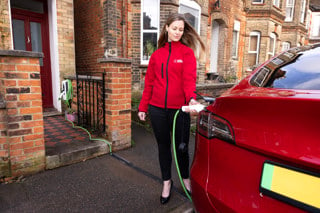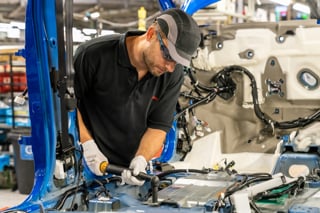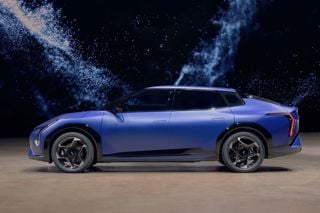The fleet and leasing sector along with the wider automotive industry has broadly welcomed the Government’s new electric car grant.
It will be worth up to £3,750 off a new battery electric vehicle (BEV), with discounts available on qualifying cars as soon as manufacturers successfully apply for them to be part of the scheme from Wednesday (July 16).
BVRLA chief executive, Toby Poston, said: “Bit, by bit, the Government is chipping away at the barriers to EV adoption.
“Targeted incentives have powered the transition to date and now the Government is acting to widen the demand base for new electric cars by providing this grant.
“This generous grant will boost uptake in the retail market but could have serious repercussions for the used market, where rampant depreciation already has red warning lights flashing.
“Further stimulating new EV registrations without supporting the used market risks creating an even greater supply/demand imbalance, putting even more pressure on fast deflating second-hand values.
“The resulting losses will erode confidence and result in higher finance costs for new EVs, eliminating much of the benefit from the original grant.”
Mike Hawes, SMMT chief executive, says that the return of Government support for the purchase electric vehicles is a “clear signal” to consumers that now is the time to switch.
“Rapid deployment and availability of this grant over the next few years will help provide the momentum essential to take the EV market from just one-in-four today, to four-in-five by the end of the decade,” he continued.
“The announcement is a welcome response to consistent calls from the industry for more support which will be in addition to the substantive subsidies already provided by manufacturers.
“Taken with recent announcements regarding infrastructure investments and Industrial Strategy, the UK has the opportunity to maintain its position as a leader in both the manufacture and sale of zero emission vehicles.”
Lisa Brankin, Ford UK chair and managing director, said: “Ford applauds the UK government for taking this step. We have been on the frontline of the conversation, highlighting the urgent need for consumer-based incentives for electric vehicles, and now they have arrived.“
Edmund King, AA president, said: “We welcome this positive move to help boost the uptake of EVs. A grant of up to £3,750 is to be celebrated and we urge drivers to take full advantage of this offer.
“Alongside the £63 million investment package to help sign the way to charging hubs on motorways and major A-roads, as well as helping fund drivers with no dedicated off-street parking to install pavement gullies so they can charge from home, this is a supercharged effort to accelerate the electric revolution.”
Calum James, general manager at Farizon UK, says that any measure that “proactively supports” UK businesses to transition to zero emission electric vans is welcome.
“It could be great financially for business, great for the environment, and great for society as a whole,” he said. “But what's imperative is that the investment is directed to where it will make the biggest material impact, and to ensure that takes place, I hope the industry - business operators, retailers and van manufacturers alike - will have their voices heard early on in this process.
“Straightforward subsidies and incentives that make van purchases easier for businesses will be welcomed, of course, but that's only part of the story.
“We need to remove the delays in the planning processes to unlock rapid expansion in the charging infrastructure, for example.”
Matthew Walters, head of consultancy services and customer value at Ayvens, believes the new electric vehicle grant will help narrow the upfront cost gap between electric and petrol vehicles, making the transition more accessible for thousands of drivers. Especially, he says in the retail sector, which accounts for 40% of new car registrations, but only 20% of new EVs.
However, he argued: “Demand for new electric cars is already strong. Over 380,000 were registered last year, and we're seeing a 21.6% market share with 34.6% growth year-to-date as manufacturers offer attractive deals to meet ZEV mandate targets and affordable new models come to market.
“We also have incentives for low-CO2 company cars and salary sacrifice schemes to the end of the decade, which will help give businesses the confidence to invest in electrifying their fleets.
“With that in mind, financial support is perhaps better targeted at the used market, which is trying to absorb the influx of EVs reaching the end of their first contract, and the effects of heavy discounting on residual values.”
The BVRLA wrote to the transport secretary last week, highlighting how used BEVs have fallen nearly 60% more in value than petrol cars since September 2022.
“This depreciation is inflating monthly costs for new vehicles even as list prices fall. Used car support, like Scotland's 0% interest loans, could help create stability in the market,” he added.
“There's also an opportunity to address the expensive car supplement before April 2026, when the first affected EVs will face VED renewals that could be £425 higher than an equivalent petrol, diesel or hybrid model - an £850-plus penalty over a three-year contract.
“An adjustment to the £40,000 threshold would provide targeted support more effectively than another purchase grant.
“While this grant will help build consumer confidence, an increased focus on the used market and addressing VED issues can have the greatest impact.”
Vicky Read, CEO of ChargeUK, said the grant was “brilliant news” for drivers and for the UK’s transition to electric vehicles.
“With a commitment to invest £6bn through to 2030, the UK’s charging industry has rolled out infrastructure ahead of demand to ensure that when drivers switch the network is there to make charging as convenient as possible,” she added.
“There are now 82,000 public charge points and a new one goes in the ground every 29 minutes on average.
“Today’s package is another vital boost to the charging industry, helping it invest with confidence.”
John Cassidy, managing director of sales at Close Brothers Motor Finance, told Fleet News: “Motorists have been crying out for incentives to switch to electric vehicles. The return of grants marks a huge step in the right direction, and removes one of the key barriers halting widespread adoption.
“Manufacturers, who have struggled to meet the zero emission vehicle (ZEV) mandate targets, will also be breathing a sigh of relief.
“While it is certainly one piece of the puzzle, the Government must make sure critical charging infrastructure is delivered to meet both demand and their own targets.
“It’s crucial that this investment is part of a multi-faceted approach to enable this shift and make the Government’s ambitions far more achievable.”
Dan Caesar, CEO at Electric Vehicles UK, believes a targeted incentive programme is a significant step forward in encouraging consumers to buy BEVs, and to make them more accessible.
“While battery-only EVs are much cheaper to buy and run than most realise, surveys show that cost misperceptions are the primary reason for hesitance,” he explained.
“A generous grant, of this nature, gives a new group of interested buyers, that might have thought that going electric was beyond them, a gentle nudge into what is great tech.”
John Lewis, CEO at Chargy, added: “Combined with the introduction of the price cap and the additional funding for on-street charge points, we can get more affordable cars on the road and more people enjoying the benefits of EVs.
Delvin Lane, CEO at InstaVolt, said: “With one-in-four new car buyers purchasing an EV, the DfT’s ECG (electric car grant) initiative could not come at a better time.
“Together with the Government’s other recent actions to support EV customer growth – including improved signage for charging hubs which will unlock opportunities for retailers hosting EV charging points and boost EV consumer confidence – the ECG will be a major contributor to help further grow EV customer demand as we transition to an all-electric future.”
Ian Plummer, commercial director at Auto Trader, says that “affordability” has consistently been the biggest barrier to electric adoption, so “it’ll be great to see these grants make it easier for more people to make the switch”.
He added: “Although this support is only for new EVs, it’s likely the momentum and attention will see even more consumers considering used electric cars too as we know the majority, almost nine in 10, of electric buyers cross-shop.”
Jason Simpson, CEO at Raw Charging, believes the grant will “significantly boost demand for EVs and make sustainable transport more accessible to UK drivers”.
Thom Groot, CEO at the Electric Car Scheme, added: “The package will not only make it cheaper to buy EVs outright but also to lease through salary sacrifice, which has been one of the main drivers of EV uptake over the past three years.
“We estimate that it will save around £1,250 a year on lease costs, which coupled with the substantial savings available through salary sacrifice, will make EVs far more affordable.
“It's been said ad nauseum that the high upfront cost of EVs is holding back uptake, especially in the private market, and our own research shows that this is the biggest barrier for over half of prospective buyers.”
While welcoming Government funding as a “step in the right” direction, Ross Palman, project lead for EV at Holman, said: “More pressing is support for the used EV market, where supply, weak residuals, and poor demand continue to hold things back. Incentives here could make a real difference.”
Will Roberts, automotive research lead for Rho Motion, added: “The numbers speak for themselves: subsidies are the quickest and largest impact on electric vehicle sales.
“The UK Government’s announcement will help drivers who are considering a new purchase, to make the move to electric vehicles.
“However, drivers will also expect the charging infrastructure to be in place and subsidies, whilst effective, need to be implemented hand in glove with a fully electric transport infrastructure.”
Adam Hall, director at Drax Electric Vehicles, says that the Government funding announcements mark a significant turning point for the UK's EV transition, delivering the kind of support package the industry has been calling for since the original plug-in car grant ended in 2022.
“The new £650m electric car grant is a positive move,” he continued. “Targeting vehicles under £37,000 is smart as it supports affordability without distorting the market. And, with electric car registrations up 34.6% year-to-date and EVs now representing 21.6% of the new car market, it’s clear there’s demand to build on.
“However, because the grant is delivered via manufacturers, there’s no guarantee that all eligible models will benefit, or that the full discount will be passed on.
“A clear, transparent system will be essential to ensure the grant reaches the customers who need it. Including sustainability standards in the criteria is also a smart move – electrification must go hand-in-hand with responsible production.”























Login to comment
Comments
No comments have been made yet.